Surviving the COVID-19 lockdown era — your family's ultimate guide
The pandemic has forced widespread change in all of our daily lives and with change often comes stress. But experts say there are simple things you can do to make life easier.
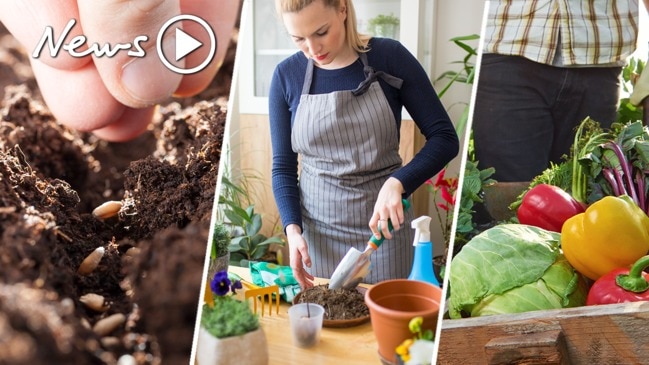
HS Coronavirus News
Don't miss out on the headlines from HS Coronavirus News. Followed categories will be added to My News.
These are monumental times for all Australians.
Whether you are in lockdown, working from home, running the gauntlet of public transport or feeling lonely in isolation, there is something we all have in common; everyone is living through a pivotal moment in history.
This means radical change for most people and experts warn adapting to rapid change has its own fall out but there are some simple strategies to cope.
Psychologist Michelle Mitchell says just a change in routine can be mentally and physically exhausting and that the COVID-19 era is overwhelming for all – not least our littlest Australians, Ms Mitchell says during these times our kids will look to us for safety.
“There is no more we can do than to hold them the best way we can and be there for them to let their feelings out. There are no rules and nothing off limits. Late night cupcake making, video games, and sleep ins may be the best way to hold an anxious teenager,” she said.
“Equal parts of play, rest and productivity will go a long way to getting through each day; as will routines and activities that bind everyone together as a family unit. Human beings always do better together.”
For the adults navigating the COVID era, Beyond Blue CEO Georgie Harman said it was important to remember people were being tested like never before.
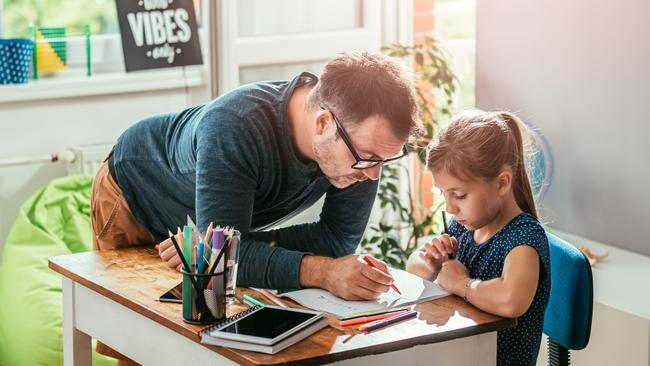
“These are tough times for many people who are being challenged in different ways.
If you are feeling frustrated, exhausted, anxious or depressed, if you are concerned about finances, employment or education, don’t wait until things get really bad or you reach crisis point,” she said.
“Sometimes it really helps just to talk things through and get some practical advice and a plan in place to help you cope.”
With so many pivotal events happening beyond our control it is important to remember that there are still things we can manage she says.
“There are many free support service choices available to meet the specific needs of individuals, such as referrals to longer term options, self-guided support, peer support networks, or low-intensity mental health coaching.
“In these times of uncertainty, one thing we can control is seeking mental health support and doing it early.”
LITTLE KIDS FEEL THE ‘BIG FEELINGS’
Psychologist Michelle Mitchell says there are ways parents can make their ‘home the hero’ so children feel safe when they are feeling overwhelmed.
“An “out of lockdown” to-do list can also be a great reminder that this will not be forever. Some families have been placing one thing they are grateful for, and one thing they are looking forward to, in a jar each week.
“That, combined with time capsules and journaling may create memories your family will one day look back on.”
Ms Mitchell points out this period is sapping up our children’s emotional energy and when they feel overwhelmed by big feelings “we have to trust that being with them is enough”.
“There is no easy answer or magical cure to big feelings,” she says.
“We must trust that the natural process of grief is designed to combats intense feelings of loss. We must also trust that the resilience inside them will rise and that they are growing in ways we can’t see.

“I am absolutely sure that our children will surface differently, with greater perspective.
“But first, home is going to hold them and teach them. Home will be the hero.
“It is my hope that our kids will always remember that home is the safest place to be when troubles comes – and the good news is it won’t always be a global pandemic.”
MANAGING FAMILY DYNAMICS
Former teacher and one of Australia’s leading child behaviour experts Michael Hawton says the key to surviving a coronavirus lockdown with your family is structure.
Whether it is wrangling sibling rivalry or trying to get your student to focus, the psychologist says a plan will give much needed structure in what can feel like chaos.
His parenting program Talk Less, Listen More, focuses around giving parents tactics in terms of knowing what to deal with – and what to ignore.
“It is the distinction between the things that are small fish and the big fish,” he says.
The program looks at the three ‘big rocks’ to focus on – therefore knowing what falls around that are the ‘MBAs (minor but annoying) things to let go through to the keeper.
“The big rocks fall into three main type of behaviour; speaking or acting rudely, hurting anyone or yourself or breaking or wrecking things,” he said.
“Once parents get their heads around what they intervene on and what they ignore then they can begin setting up a system to managing children’s difficult behaviours’.”
Mr Hawton says those three rocks represent about 95 per cent of what parents struggle with and warns that consistency is key.
He recommends a similar structured approach for parents who are struggling with getting children to focus during home schooling or homework.
“Structure helps children motivate.”
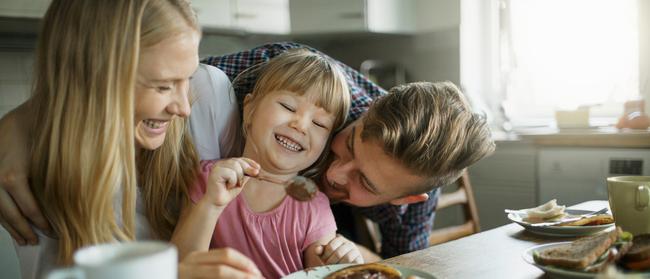
KEEPING UP STIMULATION WITH YOUNGER KIDS
Jay Weatherill, CEO of the Thrive by Five campaign, is heading up a campaign trying to overhaul early learning in Australia and says it is important to continue supporting the development of young brains.
He says: “In these uncertain times a lot of things can feel out of our control, but one thing we can control is how we support the development of our children.
Research clearly shows how central and crucial parents and caregivers are to their children’s development. Importantly, we don’t need to take drastic actions or buy expensive toys to make a big difference to our children’s brain development.
Some of the most effective brain building actions can easily be injected into your everyday routine with items found around the home.
Minderoo Foundation and Telethon Kids Institute have joined forces to help make this even easier through a free app called Bright Tomorrows. We’ve taken years of child development research and turned it into a tool that offers parents personalised ideas and activities to help build their children’s young brains.

A great example from the app is the Still As A Statue exercise which encourages the development of focus and self-control skills. Encourage your kids to be statues and freeze in a pose, such as standing on one foot, for as long as possible while you try to make them laugh.
Asking your child to recap their day or asking them to look for letters or numbers in a specific order are also really simple activities that can assist with the development of communication and focus.
Calm down your child by blowing bubbles. They can take deep breaths while blowing bubbles and you can talk to them about the bubble’s journey as it floats away to help calm their emotions.”
For families, this time can be stressful. We are living on top of each other, our kids are missing their friends and households are searching for new ways to maintain the balance between daily life, work and down time. While all of this creates challenging conditions, it also presents an important opportunity.
Building a few of these meaningful moments into your routine can help your child develop important life skills, such as responding to emotions, building attention and focus, and communicating.
These skills are important for our children at any time, but particularly now when they may be trying to manage new emotions like anxiety, feeling frightened or frustrated.
Download the app at the Apple Store or Google Play.

ISOLATING WITH YOUR PARTNER
If you are going to argue with your partner, don’t do it in the car.
“Sideline glances are threatening,” advises Melissa Ferrari, psychotherapist and relationship counsellor who said face-to-face communication allows each party to relate better and pick up physical cues.
The same goes for yelling from the study into the living room if you are both working from home during the COVID-19 period.
Ms Ferrari said if both partners working remotely it is important to have a conversation early on about putting the relationship at the top of the food chain.
“Make sure you both agree that the relationship comes first and then have some structure around what you both value and how you draw a line around what is work and what is home life.”
For example, Ms Ferrari recommends doing some exercise or having a shower or another activity that can transition you between work and home.

She also said morning conversations around important work meetings or stressful schedules are key to a seamless day.
“More than ever couples need to be aware that helping each other reduce stress is not a buzzword, it is serious. Long term issues of this kind of stress load on the body can create illness, depression, mental health issues.”
Ms Ferrari said it’s important to take into account the rises and falls of a usual working day that is taking place in the home. If your partner starts snapping at you at lunchtime when they are hungry or after they have had a difficult meeting or work conversation, consider “waving the white flag” rather than reacting.
“When one of you waves a white flag for a good reason, it is to not create a bad memory – every time we have a stressful argument we create a bad memory and over time that can wear the relationship out.”
SURVIVING .. FEELING BLUE
By Beyond Blue Lead Clinical Adviser Dr Grant Blashki
The mental health impacts of the coronavirus pandemic have strained many people’s ability to cope.
Beyond Blue is hearing from people distressed about their employment situation, financial stress and social restrictions in recent times.
Many are describing symptoms of anxiety or depression, while those with low to moderate mental health issues are exhausted and overwhelmed.
And that’s okay. At times like these, it is totally normal to be feeling despair.
The question is what to do with these feelings and find a sense of hope, meaning and a broader perspective to help you cope.

The key is to focus on aspects of our lives that we can control.
Self-care is important. Establish routines, such as going for a walk or regular phone catch ups with family or friends, and limit your social media intake if it is upsetting you.
Acknowledge your daily achievements. Helping your children get through their schooling, supporting a vulnerable relative, or checking in with someone who is going through a difficult time are significantly worthy activities.
And remember, Australians are generous and resilient.
We look out for each other in tough times – and that’s something we all can do to reduce the level of understandable despair in our communities.
If you need help, contact the coronavirus Mental Wellbeing Support Service:
1800 512 348 or coronavirus.beyondblue.org.au
BEST WAY TO EXERCISE AT HOME
Finding motivation during tumultuous times can be daunting, particularly for people who are out of routine or looking to start exercising.
Fitness coach and mum Ash Lane says there are ways to work around gym closures or changed routines.
But she warns “stopping training can have a negative impact both physically and mentally in quite a short time frame.”
She says a good technique to work exercise into your changed routine is ‘habit stacking.’
“Studies show that we’re much more likely to continue a new habit if we ‘stack’ it with an already existing habit. So, find something you do every day and connect your training to that,” she said, adding that scheduling is key.
“Schedule the time in your calendar that you’re going to train and make it non-negotiable.”
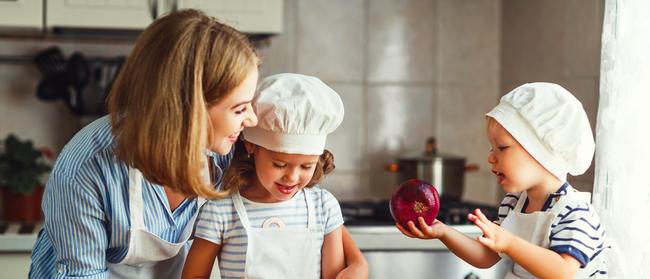
HEALTHY EATING TO AVOID COMFORT EATING
Having your pantry within reach when working from home is a tempting distraction but dietitian Leanne Elliston from Nutrition Australia says there are ways to keep unhealthy snacking at bay.
“First of all, ask yourself “Am I actually hungry or am I just bored or in need of a distraction?”
If you are actually feeling hungry then choose something small, yet filling.
She says mindless grazing is an easy trap to fall into but it really all comes back to one thing; are you hungry?
Another suggestion is to avoid having food within easy reach or constantly visible so it is less likely to tempt you.
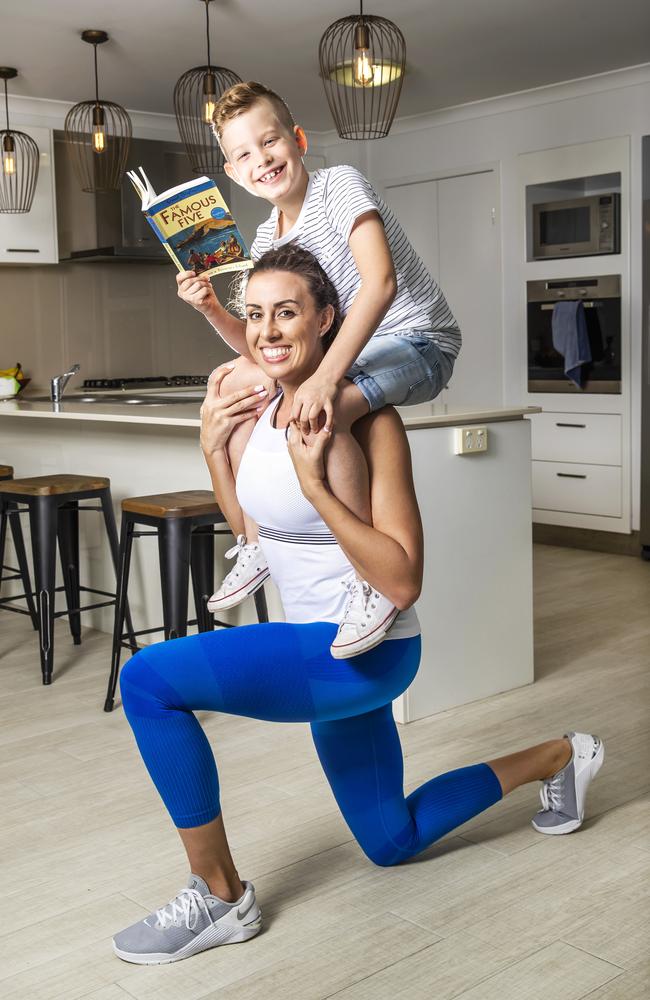
Ms Elliston says to prepare some quick, easy and healthy lunches like: baked beans on toast, soups, a salad sandwich or leftovers.
Fitness coach and nutritionist Ash Lane says stressful times often trigger an urge to reach for junk food.
“With so much restriction at the moment and heightened stress a lot of people will want to turn to comfort eating,” she says.
“I am not going to say ‘don’t do that.’ In fact studies show that there is a link between restriction and bingeing.
Mrs Lane’s top tips to manage snacking:
1 – Increase protein intake so you will feel fuller for longer, aim for 1.6 – 2.2g or protein per kilogram of body weight.
2 – Once you’ve hit your protein target for the day, include some soul foods that bring you joy.
HEALTHY SNACKS
Our favourite snacks are:
*fresh fruit
*nuts
*wholegrain crackers with cottage cheese
*vegetable sticks with hommus dip
*natural yoghurt and fruit
*air popped popcorn
